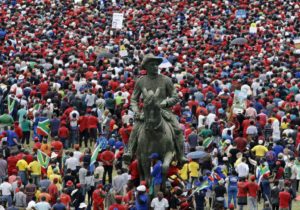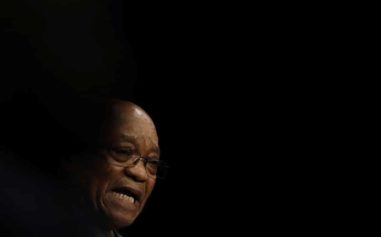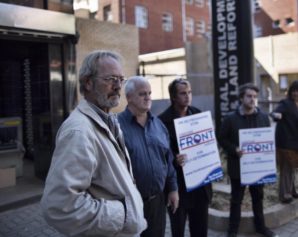
Protest outside the union build in Pretoria, South Africa (AP Photo/Themba Hadebe)
JOHANNESBURG (AP) — Tens of thousands of South Africans on Wednesday marked the 75th birthday of President Jacob Zuma with a protest against him, pushing for his resignation because of scandals and his dismissal of a widely respected finance minister.
The rally in the capital, Pretoria, which followed nationwide protests on Friday, comes amid sharp criticism of Zuma within the ruling African National Congress party, although the president still commands the support of powerful ANC factions. Zuma, who is in his second five-year term after becoming president in 2009, has become a flashpoint for concerns about government corruption and mismanagement in one of Africa’s most powerful economies.
“Take a permanent holiday!” said one protest sign mockingly wishing a happy birthday to Zuma. Some demonstrators carried a mock coffin covered with a South African flag.
Crowds gathered at a central square and marched peacefully to the Union Buildings, which house Zuma’s offices. Zuma was not expected to be there; a birthday celebration was scheduled for him in Johannesburg.
Police estimated the crowd size in Pretoria at 30,000. Protest organizers said the number was higher.
The protest united groups with sharply different ideologies. The Democratic Alliance, the main opposition party, includes many members of the white minority that still controls much of the economy 23 years after the end of apartheid. The smaller Economic Freedom Fighters party, led by former ruling party member Julius Malema, says it seeks the rapid transfer of land and industry to South Africa’s poor Black majority.
“All political parties have come together to send one message,” Malema said. “Zuma must leave office, and the soonest he does that, the better, because this country must recover economically.”
Zuma last month fired Finance Minister Pravin Gordhan, who coincidentally turned 68 on Wednesday, in a Cabinet reshuffle that intensified concerns about the direction of the country.
Some top ruling party leaders openly criticized the decision. Two agencies, Fitch and Standard & Poor’s, responded by lowering South Africa’s credit rating to below investment grade, raising concerns about a weakening currency and price increases in a country with high unemployment.
In a birthday message, the ruling party commended Zuma for his record as an anti-apartheid leader and said he was at the forefront of government efforts “to ensure that we return the land to the people, eradicate racism and build social cohesion and unity.”
Zuma spent 10 years in the same Robben Island prison where Nelson Mandela was held, but his anti-apartheid record has been overshadowed by scandals, including the spending of millions of dollars in state funds on his private home. He paid back some money after the Constitutional Court ruled against him last year.
On Monday, Zuma said many white demonstrators calling for his resignation are racist, referring to placards at demonstrations against him that allegedly depicted Blacks in a derogatory way. Opponents described the remark as an affront to legitimate protest and said the president was trying to deflect attention from the groundswell of discontent.
Key allies, including the South African Communist Party and the country’s biggest labor group, have urged Zuma to resign. The divided ANC, however, is seeking to project an image of unity and says it will defeat an opposition bid to oust Zuma in a parliamentary vote of no confidence scheduled for April 18.
A small opposition party has opened a court challenge to try to have the vote conducted by secret ballot, which analysts believe could allow some ANC lawmakers to vote against Zuma with less fear of reprisal from ruling party loyalists. The legal challenge has raised the possibility of a delay in the vote, according to South African media.
___


